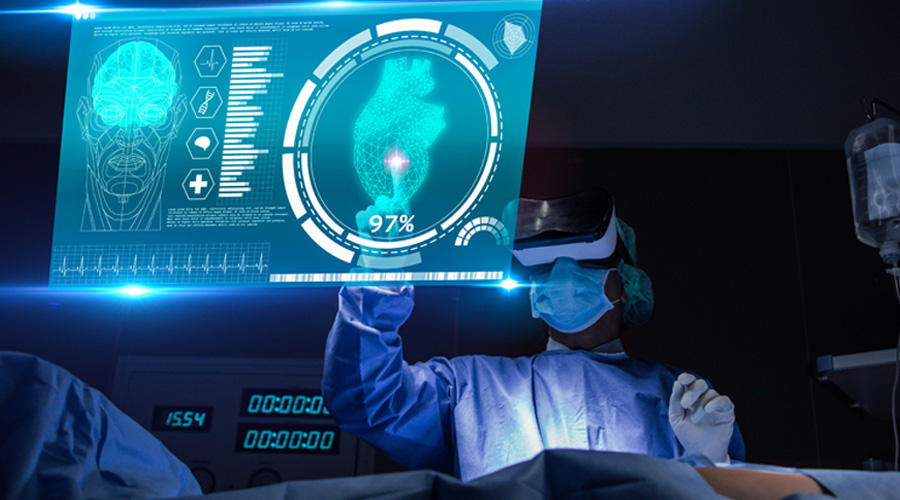Wearables and smart devices play a crucial role in shaping the future of healthcare in the Metaverse. These innovative technologies, ranging from fitness trackers to smartwatches and medical-grade sensors, offer immense potential for monitoring health, enhancing patient care, and promoting proactive wellness management. In this article, we will explore the significant role wearables and smart devices play in the healthcare Metaverse and their impact on improving health outcomes.
Introduction
The integration of wearables and smart devices in the healthcare Metaverse has opened up new possibilities for personalized, real-time healthcare. These devices empower individuals to take an active role in managing their health, while also providing valuable data to healthcare providers for accurate diagnostics, remote monitoring, and preventive interventions.
Remote Health Monitoring
One of the key roles of wearables and smart devices in the healthcare Metaverse is remote health monitoring. These devices can continuously track vital signs, such as heart rate, blood pressure, and sleep patterns, allowing individuals and healthcare professionals to monitor health parameters from anywhere. Real-time data transmission facilitates early detection of abnormalities, timely interventions, and improved management of chronic conditions.
Personalized Wellness Management
Wearables and smart devices enable personalized wellness management within the healthcare Metaverse. These devices can track physical activity, calorie expenditure, and sleep quality, providing individuals with insights into their lifestyle choices and encouraging healthy behaviors. Through data-driven recommendations and personalized coaching, wearables and smart devices help individuals make informed decisions and take proactive steps towards their well-being.
Chronic Disease Management
Chronic disease management is revolutionized by wearables and smart devices in the healthcare Metaverse. Patients with conditions like diabetes, hypertension, and asthma can monitor their health parameters in real-time, receive medication reminders, and access educational resources through connected devices. This constant monitoring and engagement enhance self-management, enable early intervention, and reduce the burden of hospital visits.
Enhanced Remote Care and Telemedicine
Wearables and smart devices contribute to enhanced remote care and telemedicine services in the healthcare Metaverse. Through these devices, healthcare providers can remotely monitor patients, conduct virtual consultations, and assess treatment effectiveness. Wearables and smart devices enable the collection of objective health data, leading to accurate diagnoses, personalized treatment plans, and improved patient outcomes.
Promoting Preventive Healthcare
With wearables and smart devices, the healthcare Metaverse emphasizes preventive healthcare. These devices can track factors such as physical activity, sleep, and stress levels, allowing individuals to identify potential health risks and make lifestyle modifications accordingly. By promoting preventive measures, wearables and smart devices reduce the incidence of chronic diseases, improve population health, and decrease healthcare costs.
Early Disease Detection
Wearables and smart devices have the potential to contribute to early disease detection within the healthcare Metaverse. By continuously monitoring health parameters and analyzing trends, these devices can identify subtle changes that may indicate the presence of underlying health conditions. Early detection allows for timely intervention and treatment, improving health outcomes and potentially reducing healthcare costs.
Medication Adherence and Management
Another important role of wearables and smart devices in the healthcare Metaverse is medication adherence and management. These devices can provide medication reminders, track medication intake, and offer dosage recommendations, helping individuals stay on track with their prescribed treatment plans. Improved medication adherence leads to better health outcomes and reduces the risk of complications.
Rehabilitation and Physical Therapy
Wearables and smart devices play a significant role in rehabilitation and physical therapy within the healthcare Metaverse. These devices can track movement, range of motion, and exercise performance, providing real-time feedback and progress monitoring for individuals undergoing rehabilitation. Virtual reality and gamification elements can be integrated into these devices to enhance engagement and motivation during therapy sessions.
Fall Detection and Emergency Response
For older adults and individuals with mobility issues, wearables and smart devices can contribute to fall detection and emergency response in the healthcare Metaverse. Equipped with sensors and algorithms, these devices can detect falls and automatically trigger emergency alerts to caregivers or emergency response services. This prompt response improves safety and can potentially save lives.
Health Data Analytics and Research
The data collected by wearables and smart devices in the healthcare Metaverse can be used for health data analytics and research purposes. By aggregating and analyzing large datasets, researchers can gain insights into population health trends, disease patterns, and treatment effectiveness. Collaboration between healthcare organizations, researchers, and technology developers is crucial to ensure ethical and secure use of health data for research purposes.
Integration with Virtual Reality and Augmented Reality
The integration of wearables and smart devices with virtual reality (VR) and augmented reality (AR) technologies expands their capabilities within the healthcare Metaverse. VR and AR can enhance the immersive and interactive aspects of healthcare experiences, providing realistic simulations, virtual environments for therapy sessions, and augmented visualization for medical procedures. This collaboration offers innovative solutions for patient care and medical training.
Patient Empowerment and Engagement
Wearables and smart devices empower patients by providing them with real-time health data and insights. This promotes active engagement in their own healthcare management. Collaboration between healthcare providers and patients in the healthcare Metaverse encourages shared decision-making, personalized care plans, and increased patient satisfaction.
Remote Patient Monitoring and Telehealth
The integration of wearables and smart devices enables remote patient monitoring and telehealth services within the healthcare Metaverse. Healthcare providers can remotely monitor patients’ health parameters, track progress, and conduct virtual consultations. This collaboration improves access to care, reduces healthcare costs, and enhances patient convenience and satisfaction.
Healthy Lifestyle Promotion and Preventive Interventions

Wearables and smart devices have the potential to promote healthy lifestyles and preventive interventions. These devices can track physical activity, sleep patterns, and nutrition, providing personalized recommendations for behavior modifications and preventive measures. Collaboration between wearables, health apps, and healthcare providers fosters proactive wellness management and reduces the risk of chronic diseases.
Real-Time Feedback and Coaching
Real-time feedback and coaching provided by wearables and smart devices contribute to the healthcare Metaverse. These devices can offer immediate guidance, reminders, and encouragement to individuals striving to meet their health and wellness goals. Collaboration between wearables, mobile apps, and healthcare professionals enhances motivation, adherence, and success in achieving desired health outcomes.
Health Monitoring for Special Populations
Wearables and smart devices cater to the unique needs of special populations in the healthcare Metaverse. For instance, devices designed for children can promote healthy habits and monitor their well-being. Wearables for elderly individuals can assist in fall detection and provide medication reminders. Collaboration between device manufacturers, healthcare providers, and user communities ensures the development of tailored solutions for specific populations.
- Wearables and Smart Devices for Remote Patient Monitoring: Wearables and smart devices have revolutionized remote patient monitoring in the healthcare Metaverse. These devices, such as fitness trackers, smartwatches, and connected medical devices, allow healthcare providers to monitor patients’ health parameters from a distance. Through continuous data collection and real-time communication, wearables and smart devices enable timely intervention and improved patient outcomes. Patients can easily transmit vital signs, such as heart rate, blood pressure, and glucose levels, to healthcare professionals, reducing the need for frequent hospital visits. Remote patient monitoring using wearables and smart devices enhances patient convenience, increases access to care, and promotes personalized and proactive healthcare management.
- Virtual Reality (VR) and Augmented Reality (AR) Applications in Healthcare: The integration of virtual reality (VR) and augmented reality (AR) technologies in the healthcare Metaverse has opened up new possibilities for medical training, surgical simulations, and patient rehabilitation. VR provides immersive experiences that allow healthcare professionals to practice procedures in a virtual environment, enhancing their skills and confidence. AR overlays digital information onto the real world, facilitating interactive patient education and visualization of medical data during consultations. These technologies improve learning experiences, increase patient engagement, and enhance rehabilitation therapies. For example, VR can simulate scenarios to help patients overcome phobias or manage chronic pain. VR and AR applications in healthcare contribute to better outcomes, increased patient satisfaction, and expanded access to specialized care.
- Artificial Intelligence (AI) and Machine Learning (ML) in Healthcare: Artificial intelligence (AI) and machine learning (ML) are transforming healthcare in the Metaverse by analyzing vast amounts of healthcare data and providing valuable insights for clinical decision-making. AI and ML algorithms can identify patterns, predict disease outcomes, and personalize treatment plans based on individual patient characteristics. For instance, AI-powered imaging systems can assist in the early detection of diseases like cancer, improving diagnostic accuracy and patient outcomes. ML algorithms can analyze electronic health records to identify high-risk patients who may benefit from preventive interventions. However, ethical considerations, such as data privacy, algorithm biases, and the need for human oversight, must be addressed to ensure responsible and unbiased use of AI and ML in healthcare.
- Smart Home Healthcare Solutions: Smart home healthcare solutions leverage the integration of wearables and smart devices with smart home technology to monitor activities of daily living and enhance care coordination. By embedding sensors and connected devices throughout the home, individuals can be monitored for falls, medication adherence, and changes in vital signs. This information is transmitted to healthcare providers, enabling real-time interventions and reducing the risk of hospital admissions. Smart home healthcare solutions also promote independent living for elderly individuals and those with chronic conditions by providing remote monitoring, emergency response systems, and reminders for medication and daily routines. These solutions improve the quality of life for individuals, reduce healthcare costs, and support aging in place.
- Personalized Health and Wellness Tracking: Wearables and smart devices offer personalized health and wellness tracking capabilities, empowering individuals to monitor and manage their well-being in the healthcare Metaverse. These devices track various parameters, including physical activity, sleep quality, nutrition, and stress levels. By collecting and analyzing data, wearables and smart devices provide personalized insights, recommendations, and behavior change interventions. Individuals can set goals, track progress, and receive real-time feedback, motivating them to make positive lifestyle choices and improve their health outcomes. Personalized health and wellness tracking promote self-awareness, self-management, and preventive healthcare, empowering individuals to take control of their health and well-being.
Conclusion
In conclusion, the healthcare Metaverse has witnessed the transformative impact of wearables and smart devices across various areas of healthcare. These technologies have revolutionized remote patient monitoring, enabling healthcare providers to track vital signs and communicate with patients in real-time. The integration of virtual reality (VR) and augmented reality (AR) has enhanced medical training, surgical simulations, and patient rehabilitation, improving outcomes and expanding access to specialized care. Artificial intelligence (AI) and machine learning (ML) algorithms have revolutionized healthcare by analyzing vast amounts of data, providing valuable insights for clinical decision-making, and personalizing treatment plans. Smart home healthcare solutions, incorporating wearables and smart devices with smart home technology, have empowered individuals to monitor their health, enhance care coordination, and promote independent living. Personalized health and wellness tracking through wearables and smart devices have empowered individuals to take control of their well-being, make informed decisions, and improve their health outcomes.




